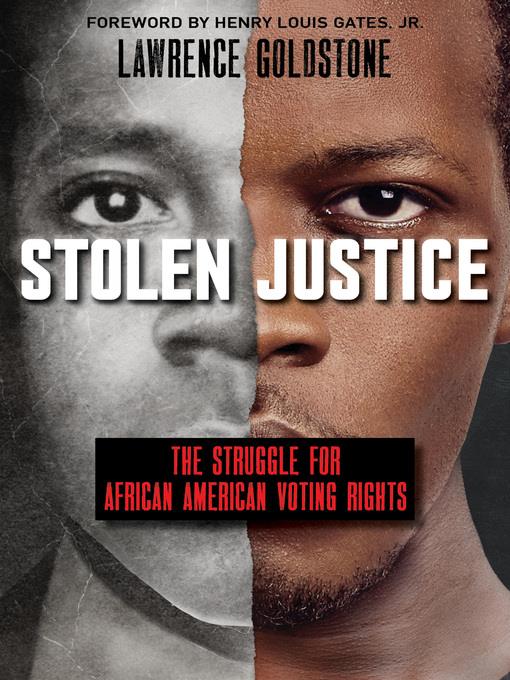
Stolen Justice
The Struggle for African American Voting Rights
فرمت کتاب
ebook
تاریخ انتشار
2020
Lexile Score
1310
Reading Level
8-11
ATOS
9.6
Interest Level
6-12(MG+)
نویسنده
Lawrence Goldstoneناشر
Scholastic Inc.شابک
9781338323504
کتاب های مرتبط
- اطلاعات
- نقد و بررسی
- دیدگاه کاربران
نقد و بررسی

October 1, 2019
What happens when the right to vote is systematically withheld from a portion of the electorate? Goldstone (Unpunished Murder, 2018, etc.) details the complex history of voting for African Americans, including the lasting impact of major decisions made at pivotal points in American history: the Constitutional Convention, the Civil War, the 13th and 14th amendments during Reconstruction, and the 1965 Voting Rights Act and its dismantling by the Supreme Court under Chief Justice John Roberts in 2013. By interweaving stories about African Americans who fought for the right to vote and those who worked against them, Goldstone deftly highlights the adversities African Americans have faced to gain and retain access to the ballot. He unpacks many of the structural, systematic, state-sanctioned, and legal blockades to voting, including state constitutional amendments in North Carolina, Mississippi, Louisiana, and South Carolina that insidiously virtually eliminated African American participation. Running parallel to the stories are portrayals of lesser-known heroes like Alex Manly, Judge Alexander Rivers, Cornelius Jones, and Jackson W. Giles who worked to dismantle systemic racism at the ballot box. Goldstone resurrects decades-old court cases, bringing new life to the past by clearly connecting yesterday to today and invoking current questions about which Americans have participatory access to democracy. Short chapters, ample photographs and illustrations, judicious use of illustrative quotations, and straightforward prose make this an engaging read. A critical work. (glossary, bibliography, source notes, illustration credits, index) (Nonfiction. 14-18)
COPYRIGHT(2019) Kirkus Reviews, ALL RIGHTS RESERVED.

November 11, 2019
In clear, vivid language, this timely volume recounts the layered history of African-American voting rights, from the 1787 Constitutional Convention to Georgia’s 2018 block against voter registration for 53,000 residents, the majority of whom were African-American. Goldstone (Unpunished Murder) traces a range of events—including the founding of the Supreme Court, the genesis of the Ku Klux Klan, and research by scientists Charles Darwin and Herbert Spencer—as he details the many ways that black people have effectively been kept from exercising the suffrage that they were legally granted in 1870. Throughout, he also focuses often on how conflicts between federal and state law have continued to affect those rights. In addition to revealing looks at the roles played by notable individuals such as Booker T. Washington and Oliver Wendell Holmes Jr. in the struggle against disenfranchisement, Goldstone further enriches the narrative with nuanced portraits of many lesser-known figures. In reference to the 1965 Voting Rights Act, Goldstone writes, “after more than a century, the promise of Reconstruction had begun to be kept,” but, leaping forward to contemporary Supreme Court rulings, he finds that promise potentially as “elusive” as ever. A strong, illuminating addition to the study of American history. Ages 12–up. Agent: Charlie Olsen, Inkwell Management.

Starred review from December 1, 2019
Gr 6 Up-Goldstone's thorough work captures the inconsistency of the U.S. Supreme Court's rulings involving the voting rights of African Americans, particularly in the Reconstruction and post-Reconstruction eras. For the most part, U.S. Supreme Court appointees during the post-Reconstruction period mirrored the general shift of attitude by white America toward reconciliation with the South, even if it meant ignoring or repealing the rights granted to African Americans with the 13th, 14th, and 15th Amendments. Goldstone builds a convincing case that the Supreme Court played a pivotal role in the reversal of African American voting rights after Reconstruction. Furthermore, he offers evidence that efforts to restrict voting rights apply to the present-day Supreme Court, citing the 2013 decision to remove the requirement mandating special permission to change election laws at the state and local levels in designated areas within the country. Immediately after the 2013 decision, many states began to institute voting restrictions, including the requirement of photo identification. VERDICT Goldstone has provided new and compelling insight into the societal impact of the U.S. Supreme Court's decisions related to voting rights. A must-buy for all high school collections.-Susan Catlett, Green Run High School, Virginia Beach
Copyright 2019 School Library Journal, LLC Used with permission.

January 1, 2020
Grades 9-12 The author of Unpunished Murder (2019), Goldstone offers another account of racism's legacy in American history. Here he details the ways in which white Americans have denied African Americans' voting rights, locally through intimidation, murder, and fraud, and more broadly through legislative action, court decisions, and difficulties enforcing the law. And lest readers regard the landmark 1965 Voting Rights Act with undue satisfaction, the book's epilogue closes with a brief account of how the Supreme Court's 2013 decision in Shelby County, Alabama v. Holder has opened the floodgates to laws restricting voting once again. A striking jacket image will draw readers to the book, which is illustrated with well-chosen archival photos, prints, posters, political cartoons, and documents. Profiling significant individuals as well as presenting a broad array of facts, legal arguments, and court cases, the text will be challenging for some, but it's a useful tool for young people researching the history of African American voting rights from the Constitutional Convention of 1787 to the present. A richly informative resource on an all-too-relevant topic.(Reprinted with permission of Booklist, copyright 2020, American Library Association.)

























دیدگاه کاربران